Stranger Than Fiction (2006): a character in search of his author | un personaje en busca de su autor
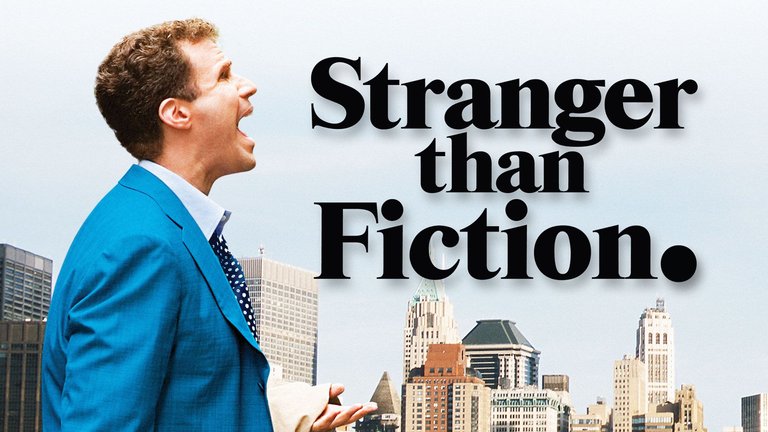
I didn't know this movie existed until a few weeks ago when a friend mentioned it to me and said "You should watch it". Although it's a phrase that is said to me very frequently, that does not usually affect my choices. I usually consider it and dismiss it outright or leave it for later (depending on a few things). However, this title caught my attention and I wanted to see it soon.
No sabía de la existencia de esta película hasta hace algunas semanas cuando una amiga me la mencionó y me dijo "Deberías verla". Si bien es una frase que me dicen con mucha frecuencia, eso no suele condicionar mis elecciones. Normalmente la considero y la descarto de plano o la dejo para después (dependiendo de algunas cosas). Sin embargo, este título me llamó la atención y quise verla pronto.
Stranger Than Fiction is a comedy-drama directed by Marc Forster and written by Zach Helm that begins with the story of Harold Crick (Will Ferrell), an extremely methodical man who lives absorbed in his routine: getting up, brushing her teeth, walking to take the bus, work at the IRS (Internal Revenue Service), come home and sleep. He does all this by rigorously following the times dictated by his wristwatch. Harold's day is a parade of minutes, hours, forms, numbers, calculations, counts... until one Wednesday comes when his life takes a turn, or rather a deviation, from its suffocating routine because he begins to hear a voice that narrates his life. It's not the voice of his conscience, it's a woman's voice, with an English accent, that we had been hearing from the beginning, but that Harold had not heard until then and that perhaps he should not hear. It's the voice of Karen Eiffel (Emma Thompson), a novelist who, in the midst of a writing block of almost ten years, is trying to finish her latest work whose protagonist is... suspense music... Harold Crick himself. In other words, Harold is the character in a work of fiction who begins to hear the voice of his creator and realize how her decisions affect his life. He is literary and literally in Karen's hands.
Stranger Than Fiction es una comedia dramática dirigida por Marc Forster y escrita por Zach Helm que comienza con la historia de Harold Crick (Will Ferrell) un hombre extremadamente metódico que vive absorto en su rutina: levantarse, cepillarse, caminar a tomar el bus, trabajar en la oficina de IRS (Internal Revenue Service, el Servicio de Impuestos Internos), volver a casa y dormir. Todo ello lo hace siguiendo con rigor los tiempos dictados por su reloj de pulsera. El día de Harold es un desfile de minutos, horas, formularios, números, cálculos, conteos... hasta que llega un miércoles en el que su vida da un giro, más bien una desviación, de su asfixiante rutina porque comienza a escuchar una voz que narra su vida. No se trata de la voz de su consciencia, es una voz de mujer, con acento inglés, que nosotros habíamos estado escuchando desde el inicio, pero que Harold no había oído hasta entonces y que tal vez no debería escuchar. Se trata de la voz de Karen Eiffel (Emma Thompson) una novelista que en medio de un bloqueo de escritura de casi diez años está intentando terminar su última obra cuyo protagonista es... música de suspenso... Harold Crick. En otras palabras, Harold es el personaje de una obra de ficción que comienza a escuchar la voz de su creadora y a darse cuenta de cómo las decisiones de esta afectan su vida. Él está literaria y literalmente en manos de Karen.
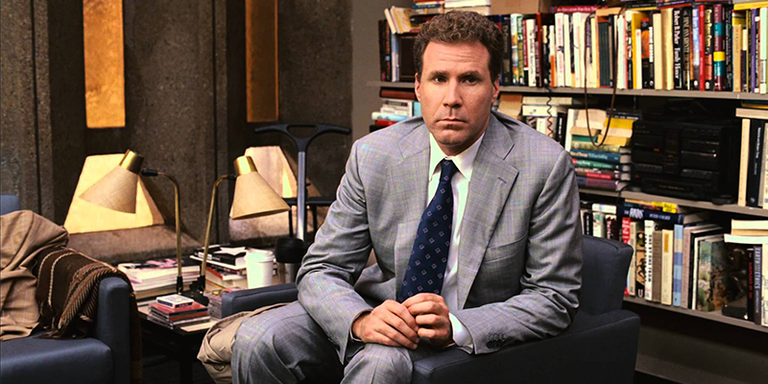
From there a series of encounters and scenes occur through which Harold's passive character begins to change. First he meets Ana Pascal (Maggie Gyllenhaal), owner of a bakery that he must audit for tax evasion; and then he seeks out Jules Hilbert (Dustin Hoffman), a professor of literary criticism who Harold believes can help him with his problem of the narrating voice he hears around him.
A partir de allí se suceden una serie de encuentros y escenas a través de las cuales el carácter pasivo de Harold comienza a cambiar. Primero conoce a Ana Pascal (Maggie Gyllenhaal), propietaria de una panadería que él debe auditar por evasión de impuestos; y luego busca al Jules Hilbert (Dustin Hoffman ), un profesor de crítica literaria que Harold cree que le puede ayudar con su problema de la voz narradora que escucha a su alrededor.
The metafictional center of the story reminded me of other great works such as The Purple Rose of Cairo by Woody Allen (a romantic comedy in which the protagonist of a film literally leaves the screen into the real world) or some stories by Allen himself in which the characters talk with the playwright who decides their destinies. I also thought of Man in the Dark, a novel by Paul Auster in which a man writes a story about a civil war in the United States and whose central character is entrusted with the task of ending the conflict in the only way they believe possible: murdering its author. The breaking of that line that separates reality from fiction generates interesting dilemmas and literary paradoxes that allow us to reflect on different things, from purely literary and artistic topics such as creativity, creative freedom and the breaking of conventional rules to philosophical and even theological ones such as the responsibility of the creator with his creation, free will, interconnectivity and the great consequences of small actions. If we could talk to the creator of our destiny, of our life, would we like to know how our adventure on this planet continues? Would we like to change something? And if we were that creator, would we want to know our creation? And if we did, would we change the destiny that we had written for him if he asked us to?
El centro metaficcional de la historia me recordó otras obras geniales como The Purple Rose of Cairo de Woody Allen (una comedia romántica en la que el protagonista de una película sale literalmente de la pantalla hacia el mundo real) o algunos relatos del mismo Allen en el que los personajes conversan con el dramaturgo que decide sus destinos. También pensé en Man in the Dark, una novela de Paul Auster en la que un hombre escribe una historia sobre una guerra civil en los EEUU y a cuyo personaje central se le encomienda la tarea de acabar con el conflicto de la única manera que creen posible: asesinando a su autor. La ruptura de esa línea que separa la realidad de la ficción genera dilemas interesantes y paradojas literarias que nos permiten reflexionar sobre diferentes cosas, desde temas netamente literarios y artísticos como la creatividad, la libertad creativa y la ruptura de las reglas convencionales hasta temas filosóficos e incluso teológicos como la responsabilidad del creador con su creación, el libre albedrío, la interconectividad y las grandes consecuencias de las pequeñas acciones. Si pudiéramos hablar con el artífice de nuestro destino, de nuestra vida, ¿nos gustaría saber cómo continúa nuestra aventura en este planeta? ¿quisiéramos cambiar algo? Y si fuésemos nosotros ese creador ¿quisiéramos conocer a nuestra creación?, y en caso de hacerlo, ¿cambiaríamos el destino que teníamos escrito para él si nos lo pidiera?
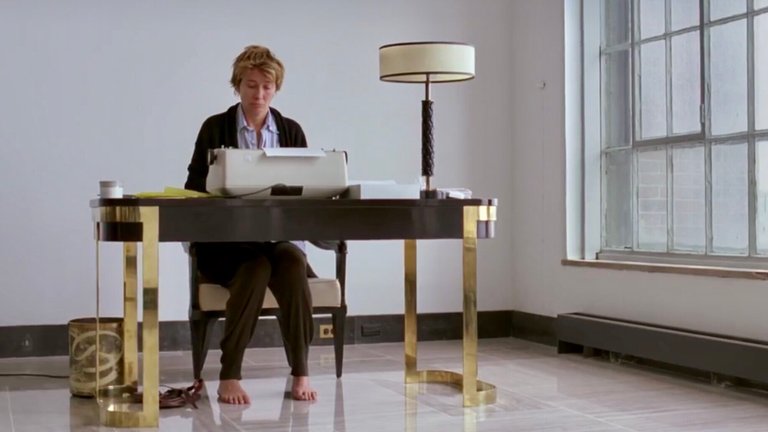
I think the film strikes a good balance between comedy, drama and philosophy. It's true that perhaps in some parts it may feel a little loose, but I don't know if it's due to the film as such or to the work that Mrs. Eiffel writes, which - I think - would be forgivable because fictions are not usually totalizing or covering every aspect, they have to leave spaces, empties that allow the reader/spectator to complete the story.
Creo que la película hace un buen balance entre comedia, drama y filosofía. Es cierto que quizá en algunas partes puede sentirse algo floja, pero no sé si se debe a la película como tal o a la obra que escribe Mrs. Eiffel, lo cual - creo yo - sería perdonable porque las ficciones no suelen ser totalizadoras ni abarcar cada aspecto, tienen que dejar espacios, vacíos que le permitan al lector/espectador completar la historia.
The cast is top notch, in my opinion. Emma Thompson turns out to be a very convincing writer amidst her reading block and her writing methods (I had forgotten to mention that her assistant is played by Queen Latifah); Dustin Hoffman is a great contribution to the film and his character helps move a plot that threatened to get stuck; Maggie Gyllenhaal is charming in her role and Will Ferrell himself, who is not one of my favorite actors, does quite well. I think it helps him to have a more reserved role, without the exaggerations typical of the films to which we are accustomed. And that mix of talent plus acceptable direction and a risky proposal that integrates comedy, drama, fantasy, romance and literature in an unconventional way make Stranger Than Fiction a more than enjoyable film. I would definitely see it again and I recommend it to all audiences, especially for book lovers, movie lovers and those who dedicate - professionally or for fun - to literary and artistic creation, I think that more than one idea will be left hanging around your head and you'll surely find some inspiration and motivation in the story of Harold and Karen, have any of you seen this movie? Do you remember any other that is similar? I read you in the comments.
El reparto es de primera, en mi opinión. Emma Thompson resulta ser una escritora muy convincente en medio de su bloqueo lector y sus métodos de escritura (había olvidado mencionar que su asistente es interpretada por Queen Latifah); Dustin Hoffman es un gran aporte a la película y su personaje ayuda a mover una trama que amenazaba con atascarse; Maggie Gyllenhaal resulta encantadora en su papel y el propio Will Ferrell que no es de mis actores favoritos lo hace bastante bien. Creo que le ayuda el tener un papel más reservado, sin las exageraciones propias de las películas a las que nos tiene acostumbrados. Y esa mezcla de talento más una dirección aceptable y una propuesta arriesgada que integra comedia, drama, fantasía, romance y literatura de una forma poco convencional hacen que Stranger Than Fiction sea una película más que disfrutable. Sin duda volvería a verla y la recomiendo para todo público, especialmente para los amantes de los libros, del cine y quienes se dedican - profesionalmente o por diversión - a la creación literaria y artística, creo que más de una idea les quedará dando vueltas por la cabeza y seguramente encontrarán algo de inspiración y motivación en la historia de Harold y Karen, ¿alguno de ustedes ha visto esta película? ¿recuerdan alguna otra que se le parezca? Los leo en los comentarios.
Reseñado por @cristiancaicedo
Other posts that may interest you | Otros posts que pueden interesarte:
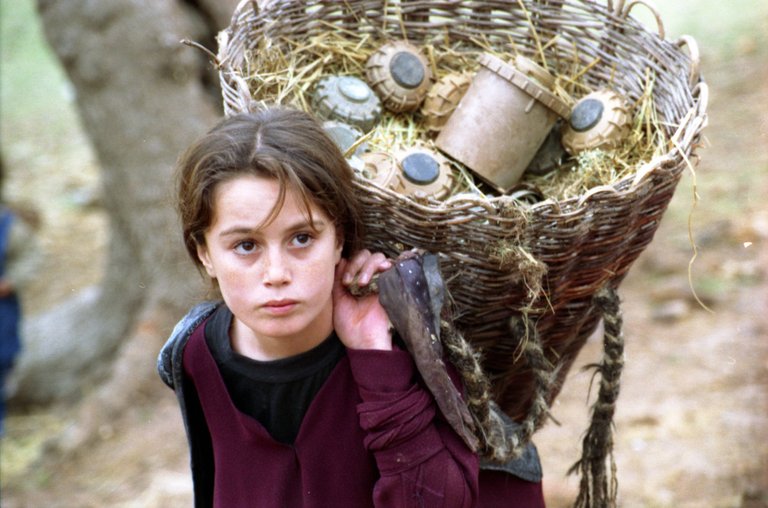 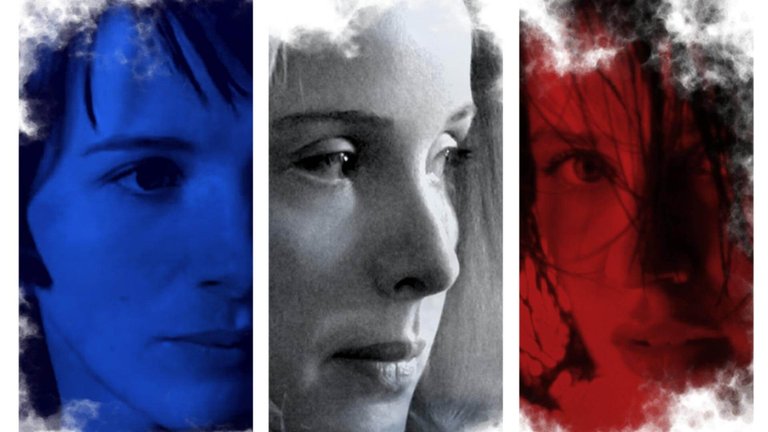 |
|---|
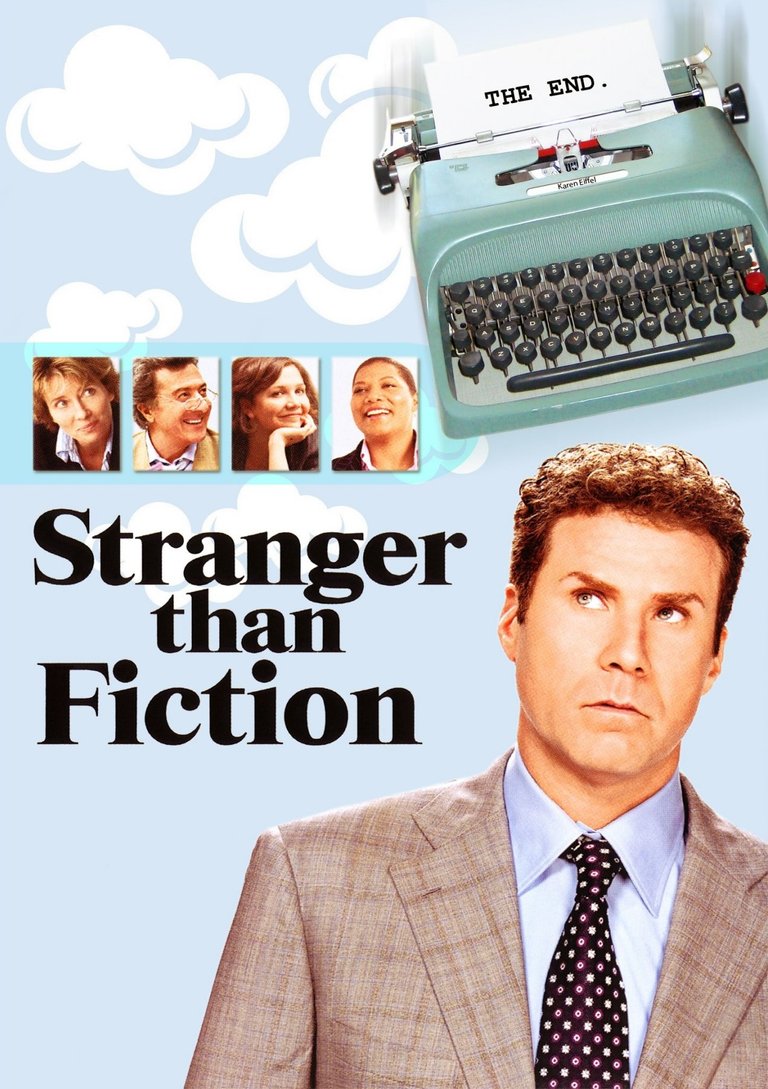
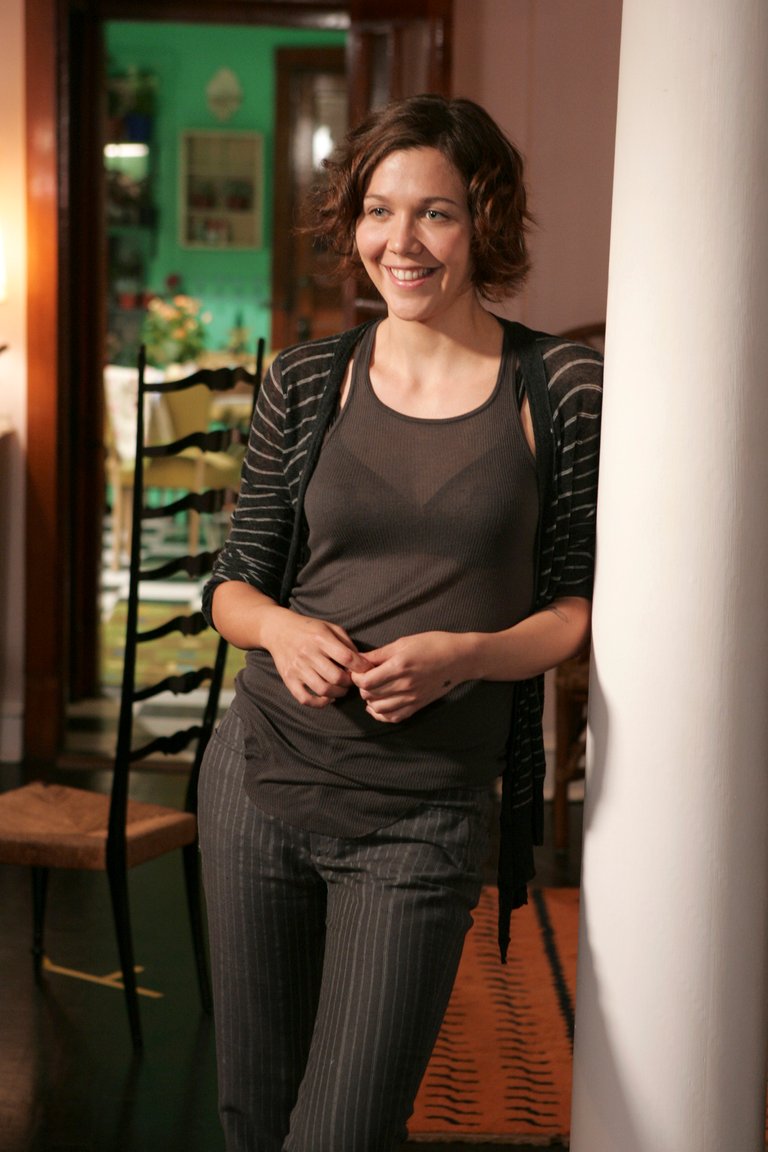
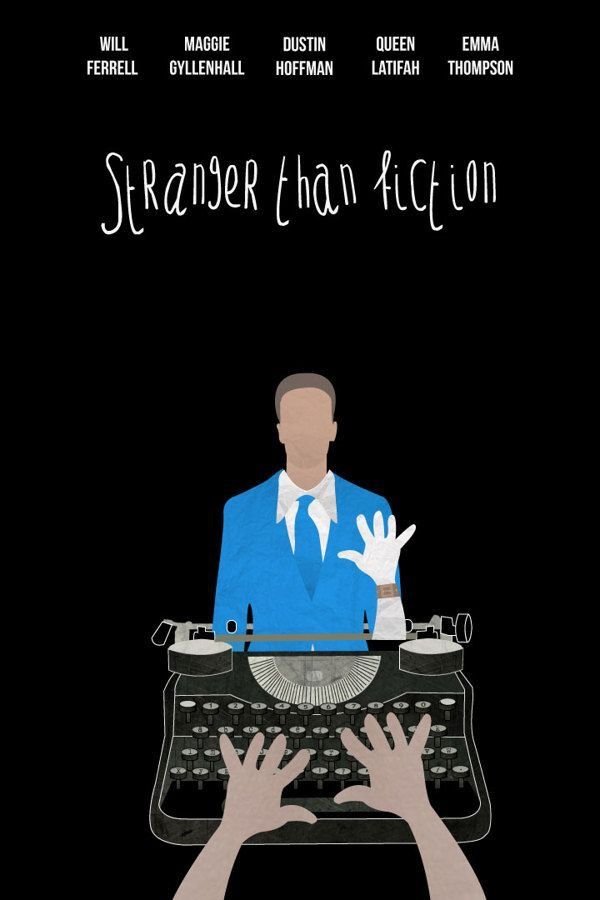
Hola, no conocía está película, pero leyendo tu reseña no me queda duda de que la quiero ver. Suena muy interesante y como me gusta leer y todo el mundo de la literatura creo que sería provechosa como bien dijiste. Así que gracias por la recomendación, un saludo!
Sí, creo que te gustará. Son historias que casi pueden leerse y eso es bien entretenido. Gracias por leerme. Saludos.
Qué película tan magistral. Es tanto lo que la amo, que no sé por dónde empezar. Su guión, el drama, las gotas de comedia, los personajes; el juego con la literatura y la historia de ésta... Amigo, qué pedazo de obra de arte. Una maravilla ver que hacen una review de Stranger than fiction. Bravo, bravo!!!
Sí, es muy buena. Conozco poca gente que la haya visto, pero sabía que en esta plataforma encontraría alguien. Saludos y gracias por leerme.